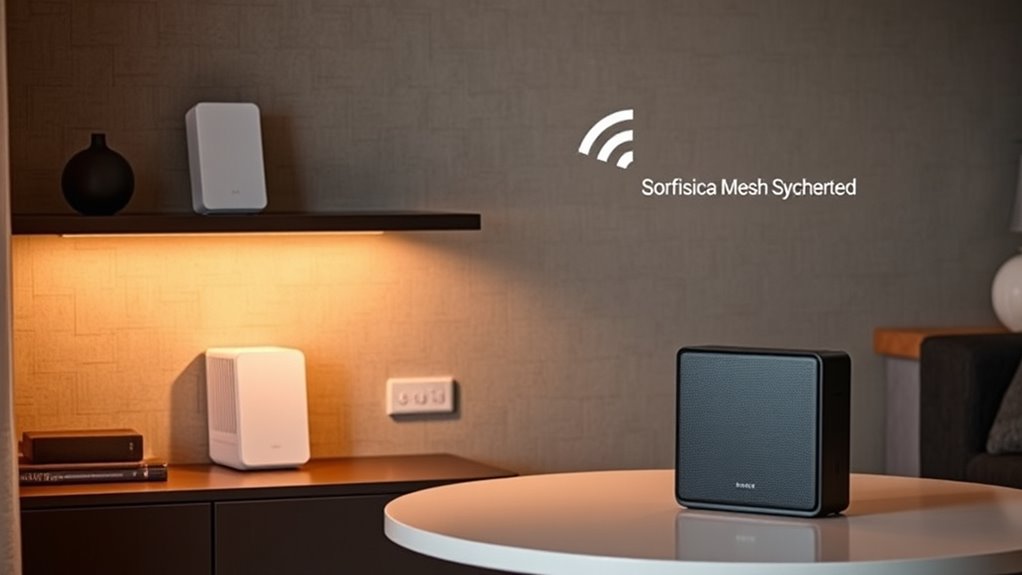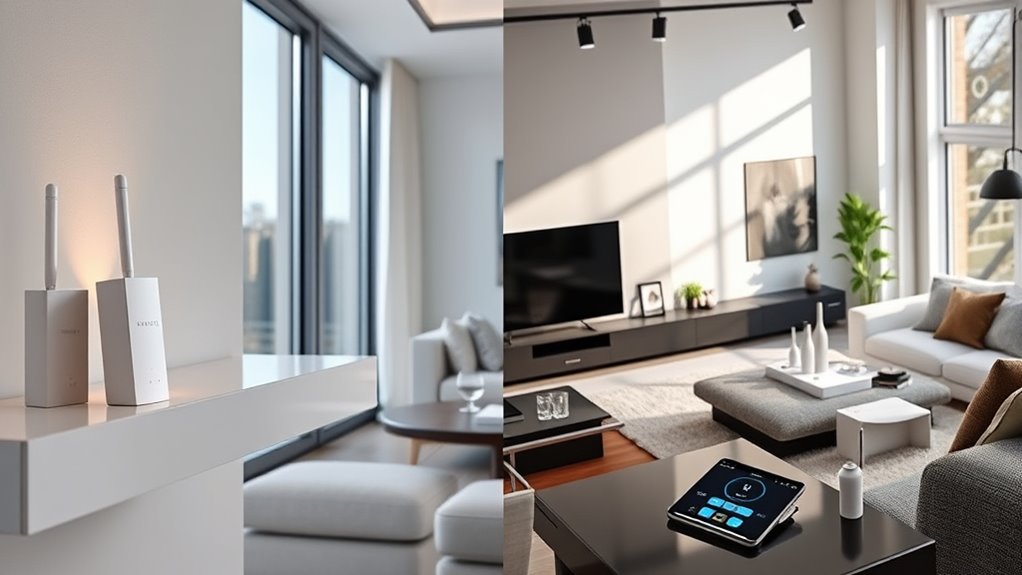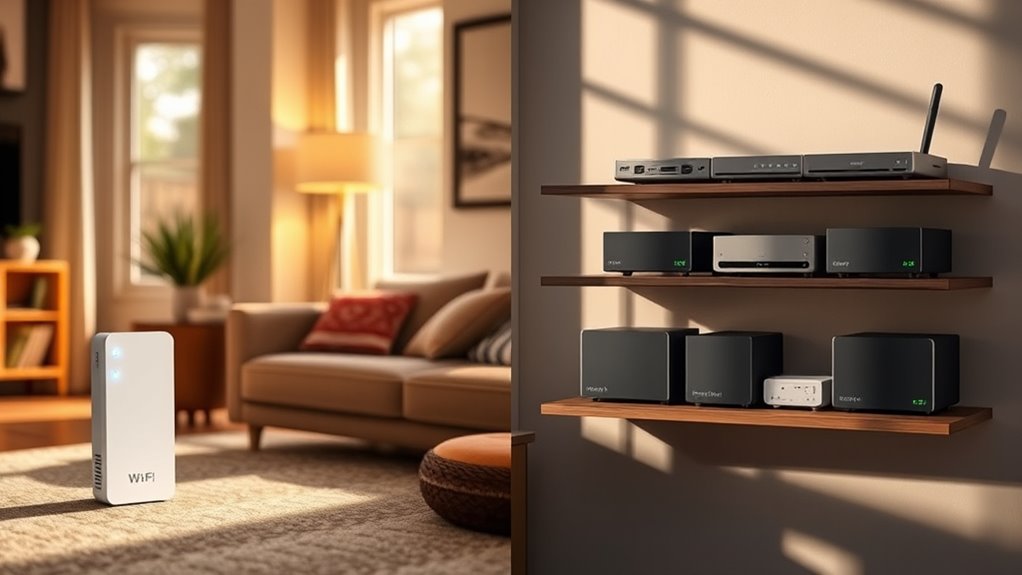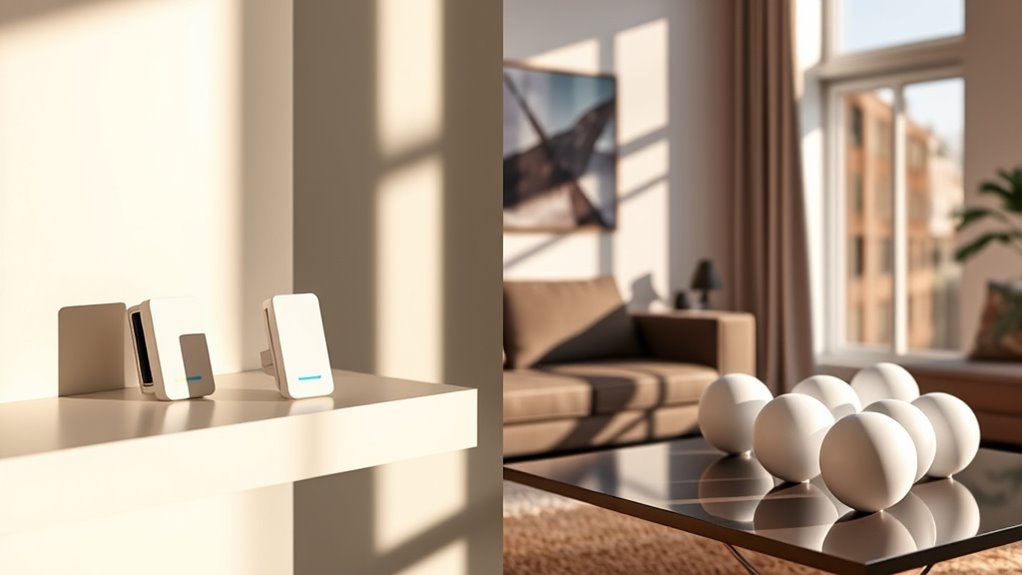When choosing between a Wi-Fi extender and a mesh system, consider your coverage needs. If you only have a few dead zones in a small area, a Wi-Fi extender can enhance your existing network at a lower cost. However, if you seek seamless coverage across a larger home or have multiple devices, a mesh system offers a unified network with better performance. Curious about the specifics that can help you make the best choice? Keep exploring!
Key Takeaways
- Use Wi-Fi extenders for small areas with minimal coverage needs and budget constraints, as they are cost-effective solutions.
- Choose mesh systems for larger homes or spaces with complex layouts, ensuring seamless connectivity without dead zones.
- Opt for mesh systems if you require a single network name (SSID) for uninterrupted device connectivity across multiple rooms.
- Consider internet usage habits; mesh systems are better suited for high-bandwidth activities like gaming and streaming.
- Evaluate future needs; mesh systems provide scalability, allowing for easy addition of nodes as home tech demands grow.
Understanding Wi-Fi Extenders

When you’re looking to boost your home’s Wi-Fi coverage, understanding Wi-Fi extenders is essential.
These devices, also known as Wi-Fi boosters or repeaters, capture and rebroadcast your existing network’s signal to reach dead zones. They offer a cost-effective solution for enhancing coverage without the expense of mesh systems. However, be aware that they require manual switching between the router and the extender’s network, which can disrupt your experience with multiple network names. Performance can vary greatly based on the incoming signal strength and the layout of your home. Additionally, the farther you place the extender from the router, the more likely you’ll experience slow speeds due to signal loss during retransmission. Proper placement is key to maximizing their effectiveness. High refresh rates can enhance the experience of streaming games or videos, making this a valuable consideration for entertainment setups. Furthermore, consider how robot vacuums can assist in maintaining cleanliness in your home while you focus on optimizing Wi-Fi coverage. Regular filter replacement is also important for maintaining optimal performance in devices like air purifiers. It is advisable to seek professional advice to ensure you choose the right solution for your specific needs. Moreover, the efficiency of your Wi-Fi setup can be further improved by understanding the role of energy-efficient heat pumps in maintaining a comfortable environment in your home while using tech devices.
Exploring Mesh Wi-Fi Systems

Mesh Wi-Fi systems offer a modern solution for anyone struggling with Wi-Fi dead zones in their home or office.
Mesh Wi-Fi systems provide an effective way to eliminate Wi-Fi dead zones in any space.
These systems consist of multiple interconnected nodes that enhance your network’s range and coverage area.
Here’s why you might consider them:
- Seamless Connectivity: Each node communicates with others, automatically connecting you to the strongest signal, eliminating the need for extenders. This feature is similar to efficient payment solutions that streamline processes for a better user experience. Additionally, mesh systems can provide energy-efficient solutions by integrating with smart home devices that optimize power usage. Furthermore, the integration of Natural Language Processing (NLP) can enhance user interactions with smart devices connected to the mesh network. Moreover, these systems can significantly boost productivity in content production, ensuring that your connected devices operate without interruption.
- Scalability: You can easily expand your network by adding more nodes, making it a scalable solution as your smart home needs grow.
- User-Friendly Setup: Most mesh Wi-Fi systems are simple to set up via a mobile app, ensuring automatic updates for security and performance.
With advanced technologies like Wi-Fi 6, you’ll enjoy improved speed and bandwidth for all your connected devices. Additionally, mesh systems are particularly beneficial for homes utilizing smart utilities to optimize energy efficiency and comfort.
Key Differences Between Extenders and Mesh Systems

While both Wi-Fi extenders and mesh systems aim to improve your network coverage, they operate quite differently.
Wi-Fi extenders rebroadcast your existing network name, often creating dead zones and struggling with signal strength over distance. You’ll need to manually switch between networks, which can be inconvenient. Additionally, it is crucial to recognize that AI technology can significantly enhance network management and performance. Moreover, understanding the importance of biodiversity hotspots can help you appreciate how diverse ecosystems thrive, just as diverse network solutions can optimize your connectivity. Furthermore, embracing the power of imagination can lead to innovative approaches in overcoming connectivity challenges. Transparency in affiliate relationships can also assist consumers in making informed decisions about network equipment.
In contrast, mesh systems create a seamless network with one SSID, automatically connecting your devices to the nearest node for uninterrupted connectivity. This is especially beneficial for online gaming, as it reduces network congestion.
Additionally, mesh systems excel in scalability, allowing you to add more nodes easily for wider coverage, while extenders can lead to performance issues when multiple units are deployed. The initial setup may be more complex, but the long-term benefits are worth it. Investing in a diversification strategy for your network solutions can ensure you have the best coverage and performance tailored to your needs.
Evaluating Your Coverage Needs

Here are three key factors to ponder:
Consider these three essential factors when assessing your Wi-Fi coverage needs.
- Existing Wi-Fi Signal: Measure your network signal strength; readings above -67 dBm indicate good coverage. Additionally, quality control tests on your network infrastructure can help identify any issues that might affect performance.
- Internet Usage Habits: If you game or stream frequently, mesh Wi-Fi systems are ideal for seamless connectivity across multiple devices.
- Dead Zones: Identify any areas in your home with weak Wi-Fi coverage. Mesh systems manage these better, while Wi-Fi extenders may only target localized dead zones. Additionally, consider how home security systems can impact your Wi-Fi needs, as some devices require stable connections for optimal functionality.
Making the Right Choice for Your Home

Choosing the right Wi-Fi solution for your home can feel overwhelming, but it doesn’t have to be.
If you live in a large home with multiple rooms and obstacles, a mesh system is often the best option. It provides a seamless Wi-Fi network, effectively eliminates dead zones, and maintains strong Internet speeds across your space. Additionally, proper sealing mechanisms can enhance the efficiency of your cooling appliances, ensuring optimal performance in your home. Moreover, using data analytics can help identify the best placement for your mesh nodes to maximize coverage. Furthermore, adopting a growth mindset can assist you in making informed choices about your home technology needs, ensuring a more efficient living environment. Furthermore, investing in solar-powered solutions can reduce your energy costs while enhancing your overall home technology setup.
On the other hand, a Wi-Fi extender works well in smaller areas or specific dead zones, but may struggle with signal degradation over longer distances.
If you want a single existing network name (SSID) for easy management, a mesh system is ideal.
For budget-conscious users with basic needs, a Wi-Fi extender might suffice, but consider your long-term performance requirements before deciding. Additionally, maintaining optimal air quality in your home can also be enhanced with the right technology choices, ensuring a healthier living environment.
Frequently Asked Questions
Should I Get Wifi Mesh or Extender?
When deciding between a Wi-Fi mesh system and an extender, consider your needs.
If you’ve got a large home with thick walls or multiple floors, a mesh system’s seamless coverage might be your best bet.
But if you’re on a budget or just need to boost signal in a small area, an extender can do the job.
Think about your space, budget, and how many devices you connect to make the right choice.
When Should I Use a Wifi Extender?
You should consider using a Wi-Fi extender when you have small dead zones in your home, and you need a simple solution to boost your existing signal.
If your coverage needs are limited and your space isn’t too large, an extender can be a cost-effective option.
Just keep in mind that you might experience reduced speeds at greater distances from your router, so placement is key for ideal performance.
Can Mesh Wifi Go Through Walls?
Ever tried to get a signal through a brick wall? It can be frustrating!
Luckily, mesh WiFi systems are designed to tackle that challenge. They use multiple nodes that work together, allowing signals to penetrate walls more effectively than traditional routers.
While the performance can vary based on building materials, you can generally expect better coverage and fewer dead zones.
What Is the Best Wifi Setup for a Large Home?
For a large home, you’ll want a setup that guarantees strong, consistent WiFi coverage throughout.
A mesh system is often your best bet, as it uses multiple nodes to eliminate dead zones, providing seamless connectivity across extensive areas. This setup automatically connects your devices to the strongest node, making streaming and gaming smooth.
If your home is over 2,000 square feet, investing in a mesh network will greatly enhance your internet experience.
Conclusion
In the end, choosing between a Wi-Fi extender and a mesh system is like picking the right tool for your home’s connectivity puzzle. If you need a quick fix for dead zones, an extender might do the trick. But if you crave seamless coverage throughout your space, a mesh system is your golden ticket. So, weigh your needs carefully, and let your Wi-Fi flourish like a garden in full bloom, connecting every corner with ease.









